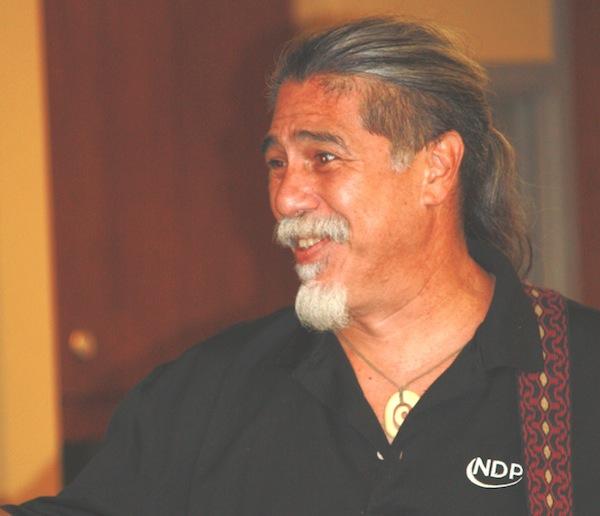Science vs. Traditional Knowledge in Climate Change: Can't We All Just Get Along?

M. Kalani Souza, Native Hawaiian, head of the nonprofit Olohana Foundation, played the guitar for attendees of the Rising Voices of Indigenous People in Weather and Climate Science Workshop July 1 – 2 at the National Center for Atmospheric Research in Boulder, Colorado. He is also with the Federal Emergency Management Agency , University of Hawaii, where he is national director of population centers, working on Native community capacity for climate change.
The hydrologist had carefully studied the scientific data and knew for a fact that water would be present if he drilled. So sure was he that he ignored a Hawaiian elder’s warning against drilling for water in that spot. The scientist did indeed hit water—but it was red, brackish and undrinkable.
He had drilled on a hill that had been named, millennia ago, Red Water. Nearby was another site that had carried the name Water for Man for thousands of years. That is where the drinkable water could be found, but it did not take a hydrologist with fancy instruments.
“We assume contemporary knowledge displaces that of the past, but it’s not true,” said Ramsay Taum, Native Hawaiian, board director of the Pasifika Foundation and on the faculty of the University of Hawaii, after giving this example of science’s potential to erroneously override indigenous knowledge.
Taum’s comments were among several themes aired in a workshop, Rising Voices of Indigenous Peoples in Weather and Climate Science, sponsored partly by the National Center for Atmospheric Research (NCAR) on July 1–2 in Boulder, Colorado. Also backing it were the Intertribal Council On Utility Policy, South Dakota; the Olahana Foundation, Big Island, Hawai’i; the Indigenous Peoples Climate Change Working Group, and the Getches–Wilkinson Center for Natural Resources, Energy and the Environment.
During the two-day conference, scholars and tribal college students grappled with the readiness issues noted in President Barack Obama’s Climate Action Plan, which he released on June 25. (Related: Obama: No Keystone XL if It Increases Carbon Emissions)
Taum’s anecdote was just one example of the myriad ways in which traditional knowledge can trump scientific knowledge, even as climate change creates yet another Trail of Tears in forcing the relocation of Native communities due to flooding, fire and other encroachments on their traditional territories. The reliance on science to the exclusion of millennia of careful observation is another way in which culture is being eroded, participants said.
“The fear of our elders is that knowledge is running faster than wisdom,” said Papalii (“Doc”) Failautusi Aveglio, a hereditary Samoan leader and a faculty member at the University of Hawaii’s school of business.
Culture is not just lost via relocation. It can result indirectly when, for example, water contamination stops people from eating locally caught fish. Tribes then require money to buy replacement food, and the loss of local food sources ultimately ends daily fishing by grandfathers and grandsons in which tradition was passed down, said Michael MacCracken, chief scientist for climate change programs, Climate Institute, Washington, D.C.
Because of such changes, Native communities are increasingly involved in addressing climate questions, workshop planners said.
Even as Native peoples become the first- and hardest-hit by climate change, their traditional ways of relating to the natural world are distorted and undervalued by Western science. On top of that lies the irony that those least affected by climate change likely had the most to do with creating the conditions that caused it, said Daniel Wildcat, Yuchi member of the Muscogee Nation and a faculty member at Haskell Indian Nations University.
The harsh climate effects could mean a “whole new Trail of Tears,” Wildcat said.
Yet such clashes between traditional and scientific knowledge seemed destined to continue, if one scientist's insight is any indication.
“I’m not interested in reconciling science and Native knowledge,” said panelist Roger Pulwarty, of the National Oceanic and Atmospheric Administration. “They mean different things.”
Pulwarty was concerned about who would represent tribal peoples in seeking climate-change solutions, since asking them to collect information would be asking them to divulge potentially confidential tribal history. Taum countered that indigenous knowledge could be presented in different ways, sometimes embodied in stories that had been passed down through generations.
“One of the things indigenous people bring to the table is a whole different concept of our place in the world,” said Wildcat in summing up the workshop’s main underlying theme. “We have been treating life around us like resources—they’re not resources, they’re relatives.”
Read more at http://indiancountrytodaymedianetwork.com/2013/07/15/science-vs-traditional-knowledge-climate-change-cant-we-all-just-get-along-150435